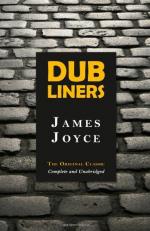He met her again a few weeks afterwards at a concert in Earlsfort Terrace and seized the moments when her daughter’s attention was diverted to become intimate. She alluded once or twice to her husband but her tone was not such as to make the allusion a warning. Her name was Mrs. Sinico. Her husband’s great-great-grandfather had come from Leghorn. Her husband was captain of a mercantile boat plying between Dublin and Holland; and they had one child.
Meeting her a third time by accident he found courage to make an appointment. She came. This was the first of many meetings; they met always in the evening and chose the most quiet quarters for their walks together. Mr. Duffy, however, had a distaste for underhand ways and, finding that they were compelled to meet stealthily, he forced her to ask him to her house. Captain Sinico encouraged his visits, thinking that his daughter’s hand was in question. He had dismissed his wife so sincerely from his gallery of pleasures that he did not suspect that anyone else would take an interest in her. As the husband was often away and the daughter out giving music lessons Mr. Duffy had many opportunities of enjoying the lady’s society. Neither he nor she had had any such adventure before and neither was conscious of any incongruity. Little by little he entangled his thoughts with hers. He lent her books, provided her with ideas, shared his intellectual life with her. She listened to all.
Sometimes in return for his theories she gave out some fact of her own life. With almost maternal solicitude she urged him to let his nature open to the full: she became his confessor. He told her that for some time he had assisted at the meetings of an Irish Socialist Party where he had felt himself a unique figure amidst a score of sober workmen in a garret lit by an inefficient oil-lamp. When the party had divided into three sections, each under its own leader and in its own garret, he had discontinued his attendances. The workmen’s discussions, he said, were too timorous; the interest they took in the question of wages was inordinate. He felt that they were hard-featured realists and that they resented an exactitude which was the produce of a leisure not within their reach. No social revolution, he told her, would be likely to strike Dublin for some centuries.
She asked him why did he not write out his thoughts. For what, he asked her, with careful scorn. To compete with phrasemongers, incapable of thinking consecutively for sixty seconds? To submit himself to the criticisms of an obtuse middle class which entrusted its morality to policemen and its fine arts to impresarios?




